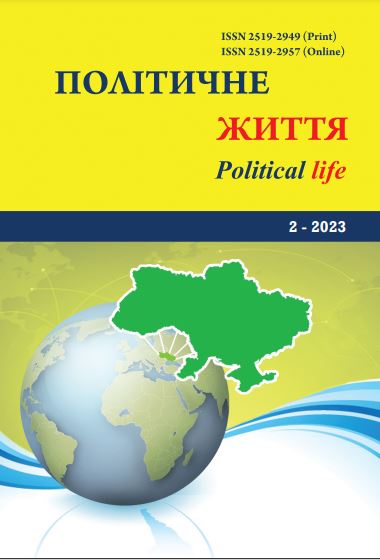Communication process as political interaction between mass media and political propaganda
DOI:
https://doi.org/10.31558/2519-2949.2023.2.7Abstract
The article is devoted to studying the political interaction between the media and political propaganda since only through a correct understanding of this relationship and the independence of the media are democratic transformations possible. In particular, attention is drawn to the intensive development of communication technologies in the modern globalised world, which leads to the fact that a person receives propaganda content under the guise of an information product. Particular attention is paid to the problem of providing truthful information to citizens and the reasons that affect it. It should be noted that this issue is particularly acute today, as the media’s profits depend on advertising, and the more citizens are interested in information that is presented truthfully, the more income will be generated, and vice versa, so it is more profitable to endure criticism than to lose income.
A significant problem raised in the article is demassification when a citizen chooses the information that they want. However, it is worth noting that not every individual can choose it because the influence of the media in the state creates a collective consciousness "united by an atmospheric shell, when certain qualities of individuals mutually mark each other, and their actions merge in unison, guided by the general flow of ideas and passions" influenced by the media.
The purpose of the study is to examine the main categories, such as political propaganda, mass media, and demassification, as well as the controversial issues related to the interaction of the media with political propaganda. Particular attention is paid to the study of the dependence of political power on the media and the consequences of this process.
References
Goncharuk-Cholach T. Mass media in the political life of society. K.: Lira-K, 2020. 254 с.
Goncharuk-Cholach T., Dzhugla N. Theory and practice of political propaganda. Textbook. K.: Lira-K, 2020. 260 с.
Trends in the development of political parties at the present stage. Scientific and theoretical almanac "Grani". Т. 24. № 12. 2022. С. 12-29
Kalinichenko B. M. The role of the media in the information war: political determinants of influence and counteraction. Kyiv: V. M. Koretsky University of Law, 2021. С. 420.
Political propaganda as a means of formation and transformation of political regimes. Dissertation for the degree of Candidate of Political Sciences. Lutsk, 2006. 150 с.
Socio-cultural and political priorities of the Ukrainian nation in the context of globalisation. Under the general editorship. O. Rudakevych. Ternopil: VPC "University Thought", 2021. 305 с.
Eurich, T. What self-awareness really is (and how to cultivate it). Retrieved from: https://hbr.org/2018/01/what-self-awareness-really-is-and-how-to-cultivate-it.
Flores Mejía, J.S., Gallegos Antúnez, R.E. and Velázquez Gatica, B. Self-knowledge groups with Psychology students. Contemporary Dilemmas: Education, Politics and Values. Retrieved from: http://www.scielo.org.mx/scielo.php?pid=S2007-78902020000800020 & script=sci_arttext.
Tejumaiye, J., Simon, G., & Obia, V. Political Advertising 2015 Presidential Election. Global Media Journal, pp. 16-31.
Tranová, K. L., & Veneti, A. The Use of Podcasting in Political Marketing: The Case of the Czech Republic. pp. 1-18. Retrieved from: https://doi.org/10.1080/15377857.2021.2024479.
Triana, K. D. L., & Yanti, N. P. E. D. Neuro-Linguistic Programming: Solutions to Improve Nurse Self-Efficacy. 2018. pp. 18-27.

